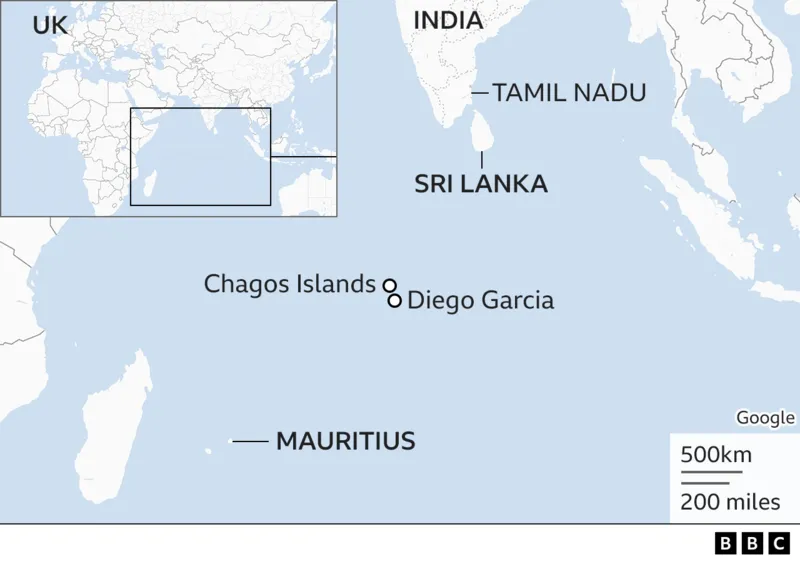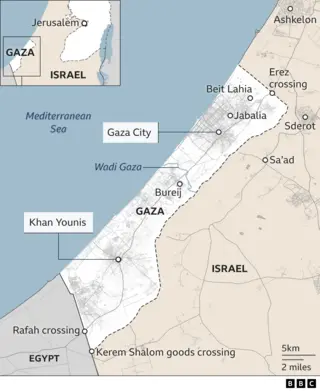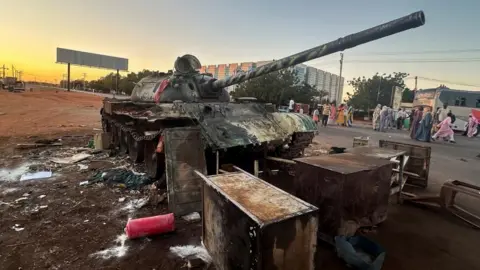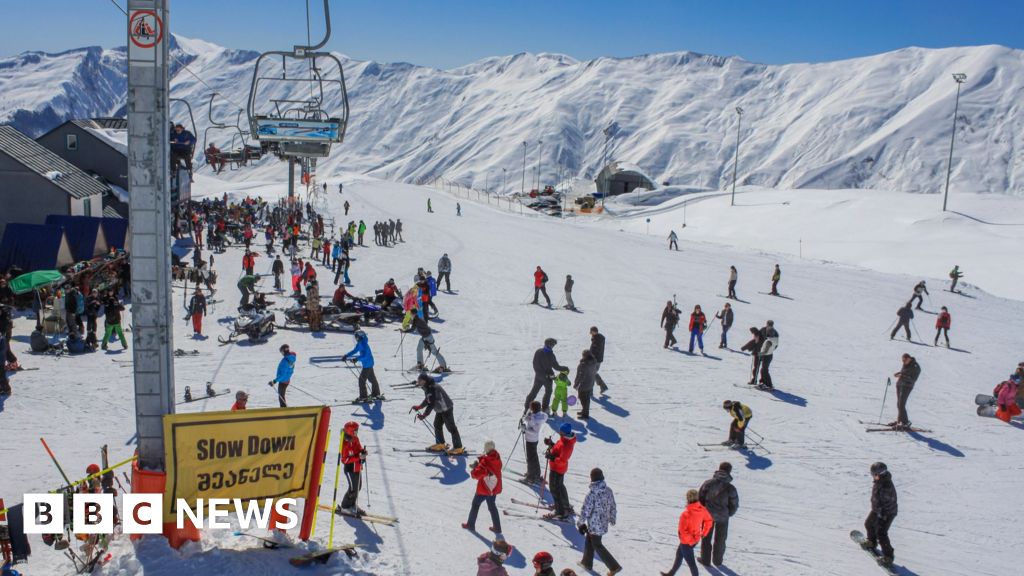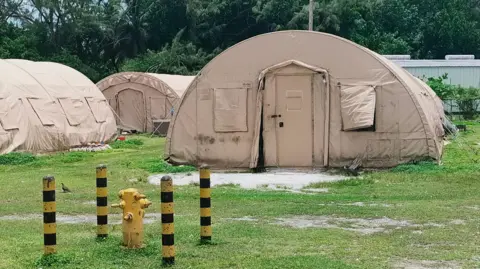 BBC
BBCIt’s morning in a makeshift camp on the remote British island of Diego Garcia, and Shanthi’s husband has just awoken to find their young children staring through a security fence.
As the children watch an officer and guard dog patrol the secretive island, home to a strategic UK-US military base in the middle of the Indian Ocean, they make a stark remark: “Even the dogs have more freedom than us.”
“When I heard that I felt heartbroken,” he says.
It was a scene that captured their family’s predicament – they were stranded on a mysterious military fortress by accident, yet had a son and daughter, aged five and nine, to raise.
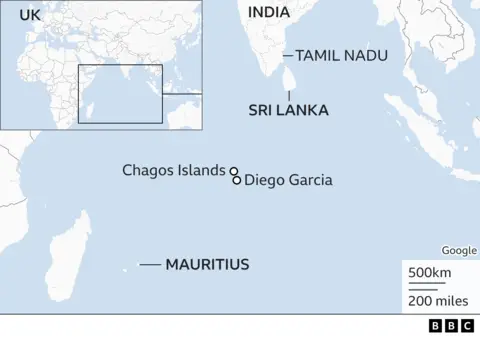
In an effort to find normality in the tiny camp they were housed in under constant surveillance, the family found ways to entertain themselves, to study, grow food and celebrate special occasions.
Shanthi, not her real name, says they had paid $5,000 (£3,900) in savings and given all of her gold jewellery to smugglers for an ambitious journey to Canada, more than 12,000 km away, with dozens of other Sri Lankan Tamils.
They all said they were fleeing persecution in Sri Lanka and India, some because of links with the former Tamil Tiger rebels who were defeated in the civil war that ended in 2009.
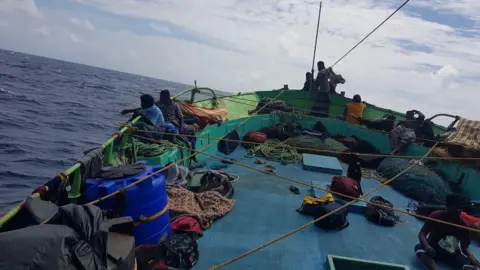
The fishing boat they were in leaked in rough seas, prompting their rescue by the Royal Navy who took them in October 2021 to Diego Garcia – and they were placed in the fenced-off migrant camp. Shanthi remembers her son asking if they had arrived in Canada.
Her young children received no formal education on the island for the first six months there so, as a trained teacher, Shanthi began giving English lessons to the children in the camp.
“We started with the basics – the alphabet, nouns, verbs, present continuous,” she says.
Shanthi’s husband later built a writing desk out of wooden pallets so the children could do homework in the tent.
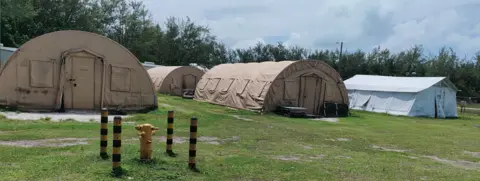
The children soon began to complain of boredom in the evenings so Shanthi – who had trained in Bharatanatyam, an Indian classical dance – began giving dance lessons, too, playing music downloaded from her phone.
Three years after the family first arrived in the camp, they were finally sent to the UK this week in what the government described as a “one off” case in the interests of their welfare.
“It’s like an open prison – we were not allowed to go outside, we were just living in a fence and in a tent,” Shanthi, aged in her early 30s, says in an interview on the outskirts of London.
“Every day our life was the same.”
It was like living “in a cage,” she adds.
While guards watched and military jets occasionally roared overhead, Shanthi and the other Tamils approached British forces on the island with a letter asking to be sent to a safe country. It marked the first time that asylum claims had ever been filed in the territory.
This sparked a lengthy legal battle 6,000 miles away in the UK, and while that took its course, Shanthi and the others stuck there, took matters into her own hands.
While the Tamils were not allowed to cook their own food, the camp was full of coconut trees, and Shanthi and others used the husks to line planters in which they grew their own vegetables – chilli, garlic and cucumber.
“They would sometimes give us red chilis so we dried them in the sun and collected the seeds and then grew them. In the salad sometimes we’d get cucumber so we collected the seeds and kept them in the sunlight and after they dried they would grow,” she says.
Every day, they would make sambol – a popular Sri Lankan side dish – by mashing the coconut and chilli.
They struggled to eat the American food served to them from the base, and would put the vegetables in hot water with garlic and chilli to try to make curries.
With limited access to clothing, particularly for the 16 children in the camp, Shanthi and other women stitched dresses from bed sheets. Come Christmas time, they turned paper napkins into flowers, and cut moon and star shapes out of food containers to decorate a tree.
Relations with the guards that watched over them were often tense, but at Diwali, Shanthi says an “officer with a good heart brought us a biryani”. On another occasion, a guard brought a cake for her son, who had been counting down the days to his birthday.
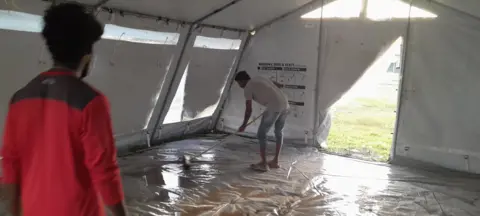
But as time went on, Shanthi says, the feelings of helplessness grew.
Life in the camp was to exist in a bubble – news of major wars breaking out in Ukraine and the Middle East trickled through from the guards watching over the migrants, but they were kept away from the base and consumed by their own lives.
Access to the island, part of the Chagos Archipelago, is heavily restricted. It has officially had no resident population since the early 1970s when the UK evicted all the people living there so it could develop the strategic base.
“From day one until we left, every day we were living with rats,” Shanthi says. “Sometimes the rats would bite our children – their legs, fingers and hands. They stole our food. At nights sometimes they would crawl over our blankets and our heads.”
Giant coconut crabs and tropical fire ants would also crawl into the camp.
During storms, rain water would pour in through holes in the tents, which had previously been used for Covid patients in the pandemic.
When United Nations investigators visited the camp late last year, the children told them they dreamed of going for a picnic, riding a bike or eating an ice cream.
At one point earlier this year, a medical official described the camp as being in “complete crisis”, with mass self-harming and incidents of attempted suicide.
“My daughter was watching everything that happened. She’d say ‘mum they’ve cut themselves. Should I cut myself?’ So I’d say ‘no, no. You can’t do anything. I’ll protect you. Come and listen to some music, come and take some paper and just draw,'” she recalls through tears.
Both she and her husband sob as they talk about the two times their daughter self-harmed.
“Both times I felt really bad and couldn’t process it. When she did this, she told me she did it because she hoped if she died her parents and her brother would go to a safe third country,” Shanthi says.
There were also cases and allegations of sexual assault and harassment within the camp by other migrants, including against children.
“Over three years we suffered so much. I don’t know how we survived,” Shanthi says.
Throughout the Tamils’ time on the island, British authorities acknowledged that it was not a suitable place for them, and said they were looking for long-term solutions. The government said the group’s wellbeing and safety was the “top priority”.
Shanthi says the happiest moment in the camp came recently when officials announced that they would be brought to the UK, where they would be given the right to remain for six months. Shanthi says no one in the camp slept that night.
Upon arriving in the UK, Shanthi says she was struck by “the cold” – and it felt like waking from a coma. She had forgotten how to download apps, send WhatsApp messages or pay in shops.
Her children talk of starting school, making friends and riding a double-decker bus.
But the family’s long-term future remains uncertain. They have now filed asylum claims in the UK in hopes of remaining. If unsuccessful, they will likely be returned to Sri Lanka.
The UK agreed earlier this year to hand over the Chagos Islands to Mauritius in a historic move. Under the deal, which has still to be signed, Diego Garcia would continue to operate as a UK-US military base but Mauritius would take responsibility for any future migrant arrivals.
Shanthi brought a shell with her from Diego Garcia to remember her time there. One day, she plans put it on a chain and wear it around her neck.
Additional reporting by Swaminathan Natarajan.
